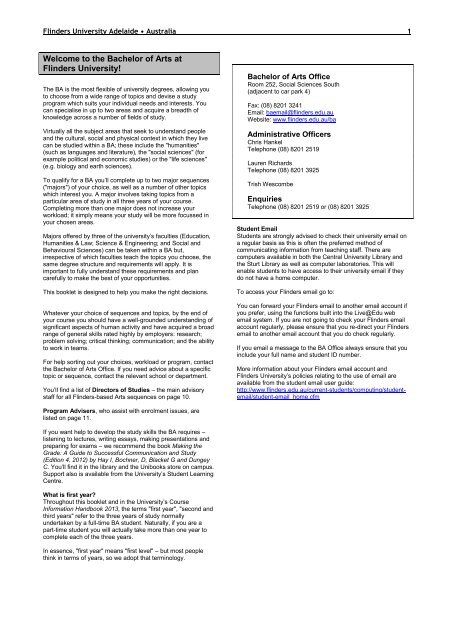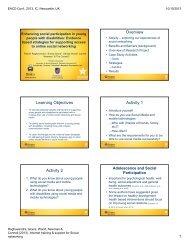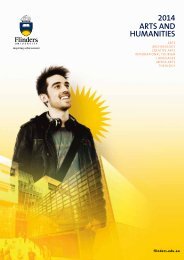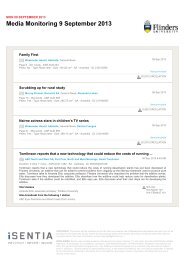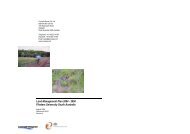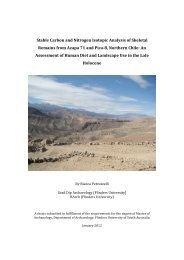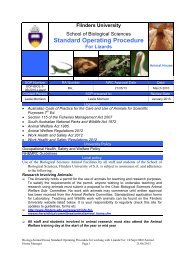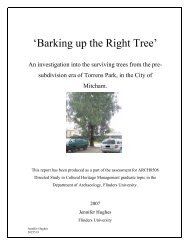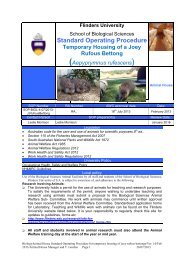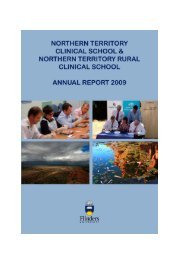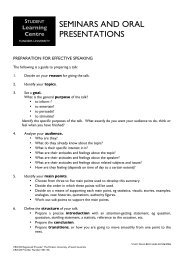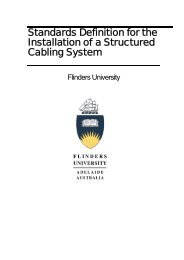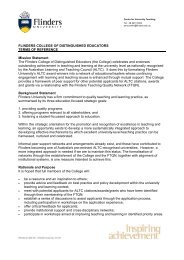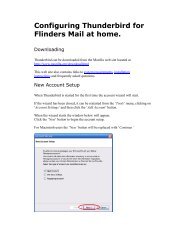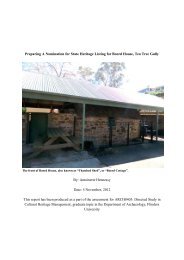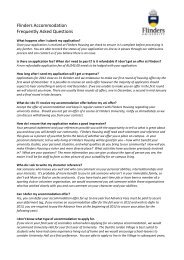Bachelor of Arts - Flinders University
Bachelor of Arts - Flinders University
Bachelor of Arts - Flinders University
Create successful ePaper yourself
Turn your PDF publications into a flip-book with our unique Google optimized e-Paper software.
<strong>Flinders</strong> <strong>University</strong> Adelaide • Australia 1<br />
Welcome to the <strong>Bachelor</strong> <strong>of</strong> <strong>Arts</strong> at<br />
<strong>Flinders</strong> <strong>University</strong>!<br />
The BA is the most flexible <strong>of</strong> university degrees, allowing you<br />
to choose from a wide range <strong>of</strong> topics and devise a study<br />
program which suits your individual needs and interests. You<br />
can specialise in up to two areas and acquire a breadth <strong>of</strong><br />
knowledge across a number <strong>of</strong> fields <strong>of</strong> study.<br />
Virtually all the subject areas that seek to understand people<br />
and the cultural, social and physical context in which they live<br />
can be studied within a BA; these include the "humanities"<br />
(such as languages and literature), the "social sciences" (for<br />
example political and economic studies) or the "life sciences"<br />
(e.g. biology and earth sciences).<br />
To qualify for a BA you’ll complete up to two major sequences<br />
("majors") <strong>of</strong> your choice, as well as a number <strong>of</strong> other topics<br />
which interest you. A major involves taking topics from a<br />
particular area <strong>of</strong> study in all three years <strong>of</strong> your course.<br />
Completing more than one major does not increase your<br />
workload; it simply means your study will be more focussed in<br />
your chosen areas.<br />
Majors <strong>of</strong>fered by three <strong>of</strong> the university’s faculties (Education,<br />
Humanities & Law; Science & Engineering; and Social and<br />
Behavioural Sciences) can be taken within a BA but,<br />
irrespective <strong>of</strong> which faculties teach the topics you choose, the<br />
same degree structure and requirements will apply. It is<br />
important to fully understand these requirements and plan<br />
carefully to make the best <strong>of</strong> your opportunities.<br />
This booklet is designed to help you make the right decisions.<br />
Whatever your choice <strong>of</strong> sequences and topics, by the end <strong>of</strong><br />
your course you should have a well-grounded understanding <strong>of</strong><br />
significant aspects <strong>of</strong> human activity and have acquired a broad<br />
range <strong>of</strong> general skills rated highly by employers: research;<br />
problem solving; critical thinking; communication; and the ability<br />
to work in teams.<br />
For help sorting out your choices, workload or program, contact<br />
the <strong>Bachelor</strong> <strong>of</strong> <strong>Arts</strong> Office. If you need advice about a specific<br />
topic or sequence, contact the relevant school or department.<br />
You’ll find a list <strong>of</strong> Directors <strong>of</strong> Studies – the main advisory<br />
staff for all <strong>Flinders</strong>-based <strong>Arts</strong> sequences on page 10.<br />
Program Advisers, who assist with enrolment issues, are<br />
listed on page 11.<br />
If you want help to develop the study skills the BA requires –<br />
listening to lectures, writing essays, making presentations and<br />
preparing for exams – we recommend the book Making the<br />
Grade: A Guide to Successful Communication and Study<br />
(Edition 4, 2012) by Hay I, Bochner, D, Blacket G and Dungey<br />
C. You’ll find it in the library and the Unibooks store on campus.<br />
Support also is available from the <strong>University</strong>’s Student Learning<br />
Centre.<br />
What is first year?<br />
Throughout this booklet and in the <strong>University</strong>’s Course<br />
Information Handbook 2013, the terms "first year", "second and<br />
third years" refer to the three years <strong>of</strong> study normally<br />
undertaken by a full-time BA student. Naturally, if you are a<br />
part-time student you will actually take more than one year to<br />
complete each <strong>of</strong> the three years.<br />
In essence, "first year" means "first level" – but most people<br />
think in terms <strong>of</strong> years, so we adopt that terminology.<br />
<strong>Bachelor</strong> <strong>of</strong> <strong>Arts</strong> Office<br />
Room 252, Social Sciences South<br />
(adjacent to car park 4)<br />
Fax: (08) 8201 3241<br />
Email: baemail@flinders.edu.au<br />
Website: www.flinders.edu.au/ba<br />
Administrative Officers<br />
Chris Hankel<br />
Telephone (08) 8201 2519<br />
Lauren Richards<br />
Telephone (08) 8201 3925<br />
Trish Wescombe<br />
Enquiries<br />
Telephone (08) 8201 2519 or (08) 8201 3925<br />
Student Email<br />
Students are strongly advised to check their university email on<br />
a regular basis as this is <strong>of</strong>ten the preferred method <strong>of</strong><br />
communicating information from teaching staff. There are<br />
computers available in both the Central <strong>University</strong> Library and<br />
the Sturt Library as well as computer laboratories. This will<br />
enable students to have access to their university email if they<br />
do not have a home computer.<br />
To access your <strong>Flinders</strong> email go to:<br />
You can forward your <strong>Flinders</strong> email to another email account if<br />
you prefer, using the functions built into the Live@Edu web<br />
email system. If you are not going to check your <strong>Flinders</strong> email<br />
account regularly, please ensure that you re-direct your <strong>Flinders</strong><br />
email to another email account that you do check regularly.<br />
If you email a message to the BA Office always ensure that you<br />
include your full name and student ID number.<br />
More information about your <strong>Flinders</strong> email account and<br />
<strong>Flinders</strong> <strong>University</strong>’s policies relating to the use <strong>of</strong> email are<br />
available from the student email user guide:<br />
http://www.flinders.edu.au/current-students/computing/studentemail/student-email_home.cfm


